“Priscilla” review: Sofia Coppola's Priscilla and Elvis biopic presents an American fairy tale all shook up

From Vegas impersonators to Oscar-nominated performances, Elvis Presley has more than received his due in pop culture. Now, after decades in his shadow, Priscilla Beaulieu Presley gets the Hollywood treatment herself.
Sofia Coppola writes and directs off Priscilla's own memoir Elvis and Me, turning her auteurial discernment for the isolation and loneliness of girlhood to the complicated romance of Priscilla and Elvis. When we first meet Priscilla, she's only 14 years old, sporting a spunky ponytail and doing her homework at a soda fountain. Living on a military base with her family in Germany, she scores an invite to a party at Presley's residence, setting in motion the relationship that would come to define her life.
Coppola charts the insidious ways in which Presley grooms and isolates the teenage Priscilla until she has no agency over her own life. At first, he's the perfect gentleman, delivering her home by curfew nightly, restricting intimacy to hugs and chaste kisses, and striving to win over her parents. But once Elvis gets Priscilla to Graceland, he begins to dictate everything from the clothes she wears to the color of her hair. Priscilla can't help falling in love with Elvis, but as he grows increasingly distant and she finds her own voice as a woman, she begins to see the limits of the life he's built for her.
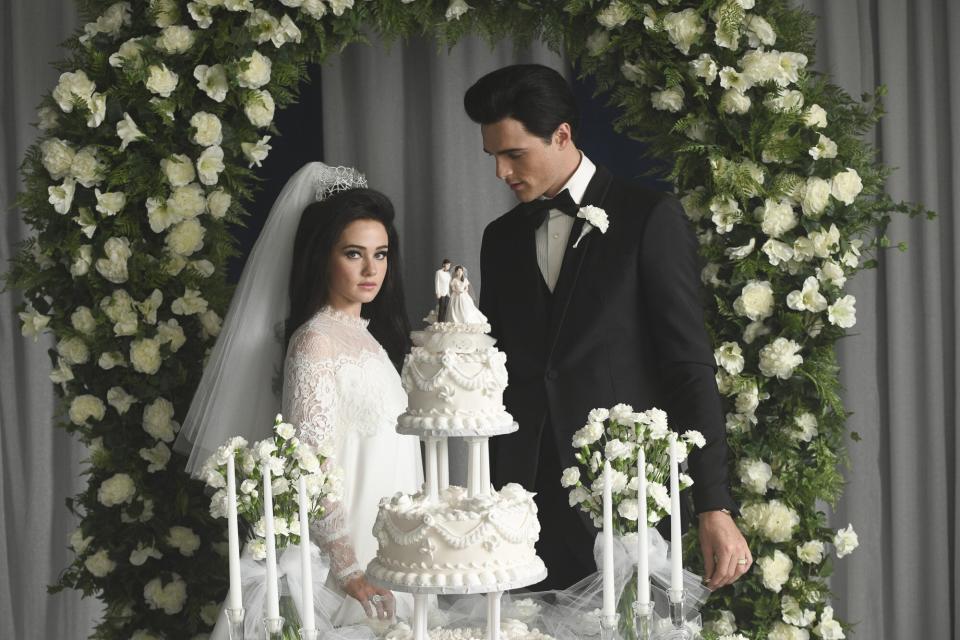
A24 Cailee Spaeny as Priscilla Presley and Jacob Elordi as Elvis Presley in 'Priscilla'
Priscilla is by no means a perfect film, but it's refreshing for its mere existence — and few could have tackled the subject matter with as much nuance as Coppola. In last year's Elvis, the character of Priscilla was reduced to a simpering bouffant, and here, she is a fully realized human being (a notion furthered by the fact that Presley herself is a producer).
Working with production designer Tamara Deverell, Coppola crafts a precise, pink prison for Priscilla from the film's opening shots that hyper-focus on a plush flamingo-colored carpet and Priscilla's matching toenails to the careful application of her signature winged eyeliner that is the embodiment of Taylor Swift lyric, "Cat eye sharp enough to kill a man." A fitting parallel given both women's business acumen and ability to commodify and interrogate the expectations of femininity.
That's precisely what Coppola is seeking to do here. As she has done with everything from The Virgin Suicides to Marie Antoinette, Coppola is a filmmaker who portrays girlhood on the Venus razor's edge. In her hands, girls are feral, capricious creatures, isolated by the porcelain perfection of their beauty and societal expectations that stand at odds with the raging desires and imaginings inside their heads. That is exactly who Priscilla is when we meet her here — a child fumbling toward her idea of what is to be a grown-up.
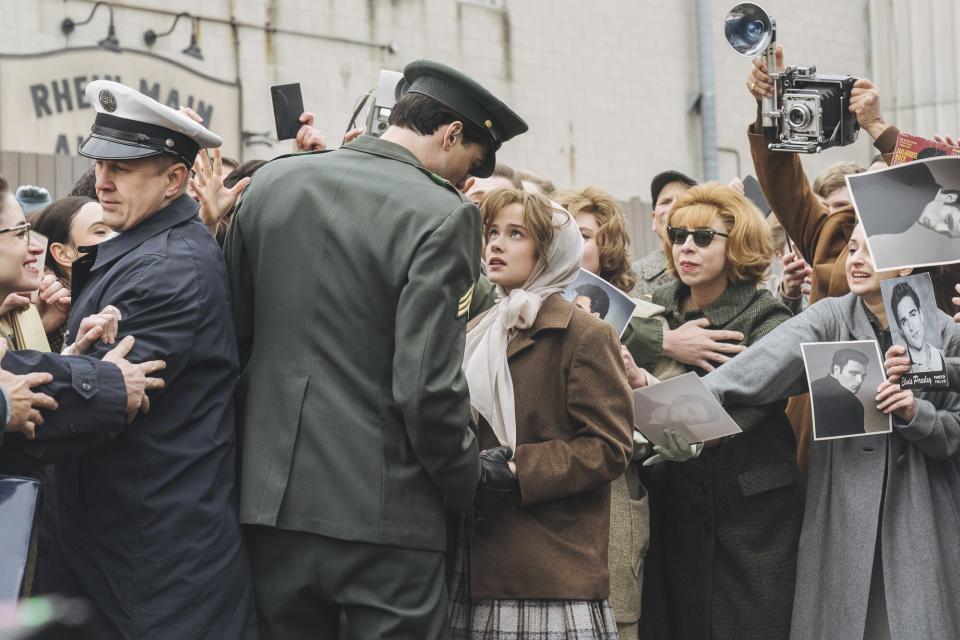
Sabrina Lantos/A24 Jacob Elordi and Cailee Spaeny in 'Priscilla'
We follow her life with Elvis from their first meeting when she was 14 to their split when she was 28. That's a wide age range to assign to one actor, but Cailee Spaeny is preternatural in her ability to believably move from naive teen to self-possessed woman. Spaeny transforms from the portrait of teenage innocence into Elvis' Pygmalion, before finally arriving at a place of maturation and authenticity. She sells that gradual arc — represented so precisely through Priscilla's physical trappings of hair, fashion, and make-up — with graceful subtlety.
She's matched by Jacob Elordi's Elvis, a portrait of the "king" that feels antithetical to nearly every other representation of him that Hollywood has devised. Elordi, who is having a hell of a year with the one-two punch of this and Saltburn, never gives us Elvis the icon. Coppola doesn't let him. Yes, he's got the distinctive Memphis drawl and the shoe-polish black hair, but our only glimpse of him as a performer is one shot of him from behind in his Vegas-era white jumpsuit. Instead, Elordi creates an Elvis who is more petulant and immature than the actual teenager he's dating. People will surely be eager to compare his performance to Austin Butler's Oscar-nominated turn in Elvis, but it's a futile exercise given how utterly different their assignments are.
There's a soulfulness to Elordi's portrayal, too; it's not difficult to see why Priscilla would be enamored with an older, famous man doting on her and claiming she was the only girl who could understand him. This rendering of Elvis makes it clear that it was his loneliness and lost boy energy that drew him to Priscilla in the first place. In his more tender scenes, he is equally a child, a boy who has lost his mother and who surrounds himself with rough-housing good old boys. But Elordi's towering 6'5" frame (overshadowing Elvis' reported six-foot height) helps him turn on a jukebox dime, the lost little boy lashing out with a menace laced with the brutality of 1950s notions of manhood.
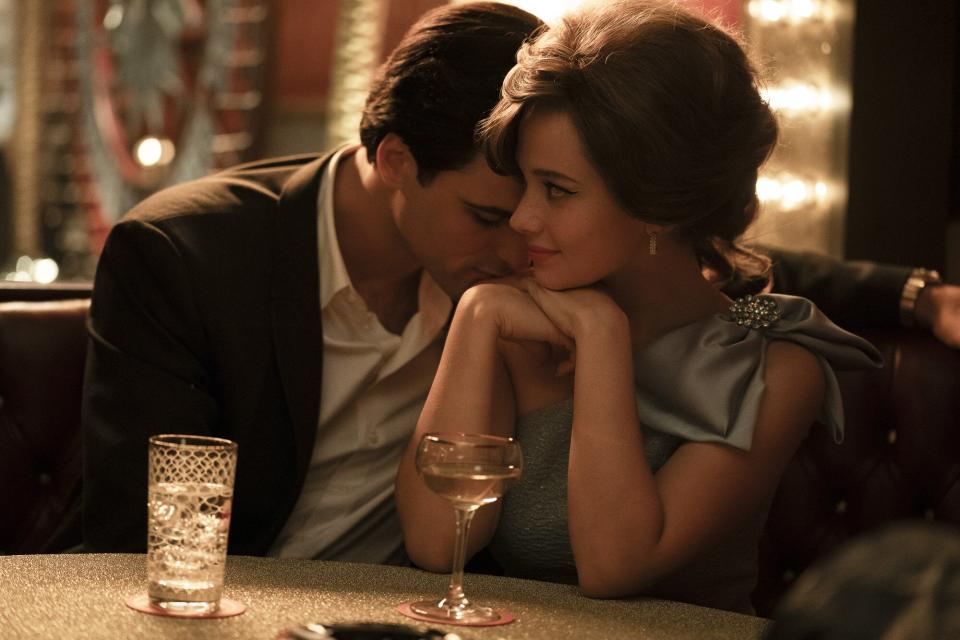
Ken Woroner/A24 Jacob Elordi and Cailee Spaeny in 'Priscilla'
At its heart, Priscilla is a story of loneliness — the peculiar, bottomless brand of it that comes only with the experience of being more image than individual. Overseas in Germany, it is their homesickness that first unites Priscilla and Elvis, but it is that same gnawing sense of abandonment that ultimately drives them apart. Once she relocates to Memphis, Priscilla is not permitted to form bonds with her peers because of her ties to Elvis. But her schoolwork also isolates her from the adults who surround her. Slowly but surely, Elvis seeks to eliminate any original thought she might have — dictating what she wears, how she styles her hair, teaching her to shoot, and worst of all, indoctrinating her into his pharmaceutical routine of uppers and downers. He builds her a gilded cage constructed out of hairspray, eyeliner, and amphetamines.
She becomes his doll, dressing in lacy, satin nighties and taking boudoir photos that replicate a cliched idea of sexuality rather than a moment of connection that is in any way sexy. With heartbreaking clarity, Spaeny showcases the ways in which Priscilla becomes an image of love and marriage for Elvis to project to the world, particularly in a moment when she applies her eyeliner with a chilling serenity while actively in labor.
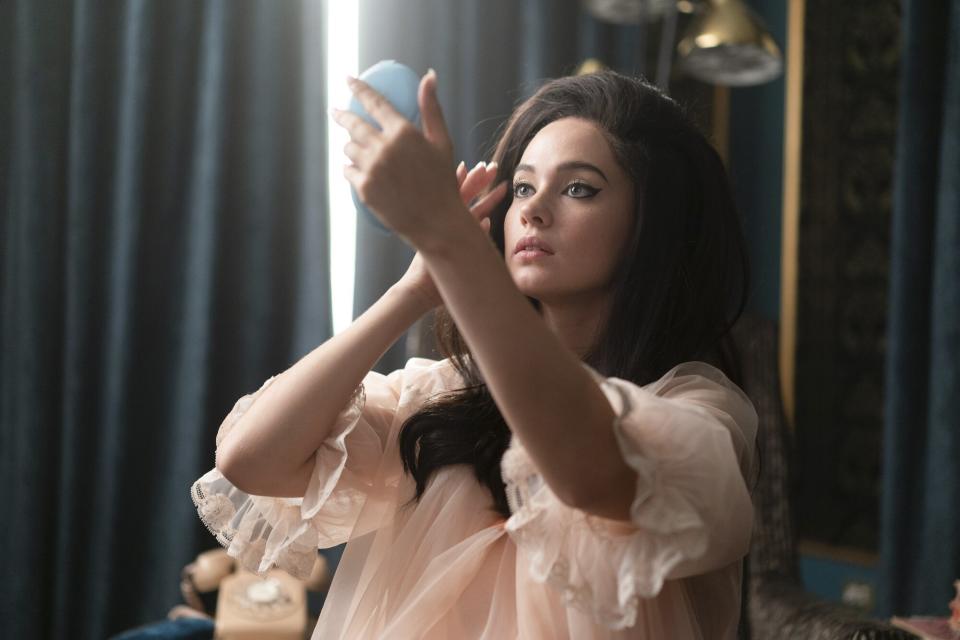
Sabrina Lantos/A24 Cailee Spaeny in 'Priscilla'
But while Priscilla nails its first two acts and the sparks of rebellion that will ultimately enable Priscilla to set herself free, it doesn't dig deep enough in its third act. It sidesteps well-documented affairs Priscilla had, which is neither here nor there. But most crucially, it gives us no clear sense of how or why Priscilla finds herself. "You're losing me to a life of my own," she tells Elvis when she asks to be released from their marriage. But we scarcely get a sense of that, outside of some brief scenes of karate lessons and dinners with friends.
Priscilla, as she is now, is a force to be reckoned with — immediately following their divorce, she opened her own clothing boutique. It is Priscilla who has kept the flame of Elvis' legacy burning, as the founder and president of Elvis Presley Enterprises, following his death. While that version of her was undoubtedly unearthed via gradual awakening, it's disappointing to see Priscilla's journey toward agency given short shrift in her own story.
Coppola wants us to understand the ways in which Priscilla became as much a creative project as one of Elvis' songs or films, and she does so ingeniously. Elvis, likely via Colonel Parker (who is nothing more than an offscreen presence here), grooms Priscilla to sell a particular brand of domesticity and womanhood. But Coppola glosses over what makes Priscilla most interesting: the ways in which the woman found ways to maintain her association with Elvis while also fully becoming her own person.
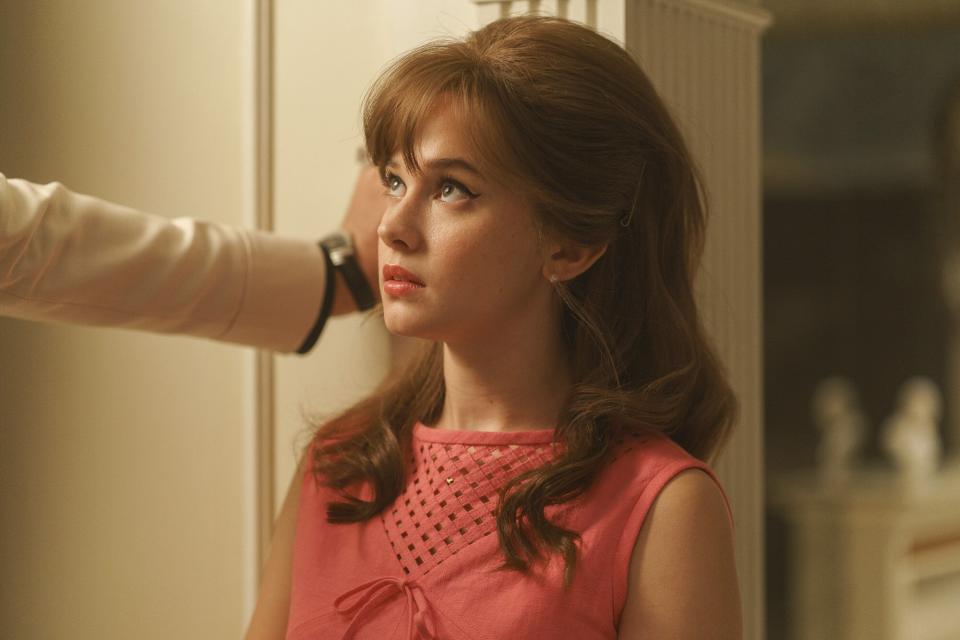
Sabrina Lantos/A24 Cailee Spaeny in 'Priscilla'
The final scene of the film, brilliantly accompanied by Dolly Parton's original rendition of "I Will Always Love You" — a song Elvis sang to Priscilla the day they divorced — captures the never-ending bond between Elvis and Priscilla and the complexities of their relationship. It is true that in so many ways the love between them never died. But it's clear that Priscilla also learned to love herself, and Coppola's film is missing the spark of that journey in its third act.
Priscilla took the lessons she learned from Elvis' manipulation and control and subverted them to her own ends (she is the one, after all, who had the strength to sever their more toxic ties in spite of that enduring love); that is the stuff of a hero's journey, yet it is not part of Coppola's tale. Priscilla is incisive in its portrayal of its central relationship, but it needs a little less conversation, a little more action when it comes to its heroine's path to self-determination. Grade: B
Want more movie news? Sign up for Entertainment Weekly's free newsletter to get the latest trailers, celebrity interviews, film reviews, and more.
Related content:


